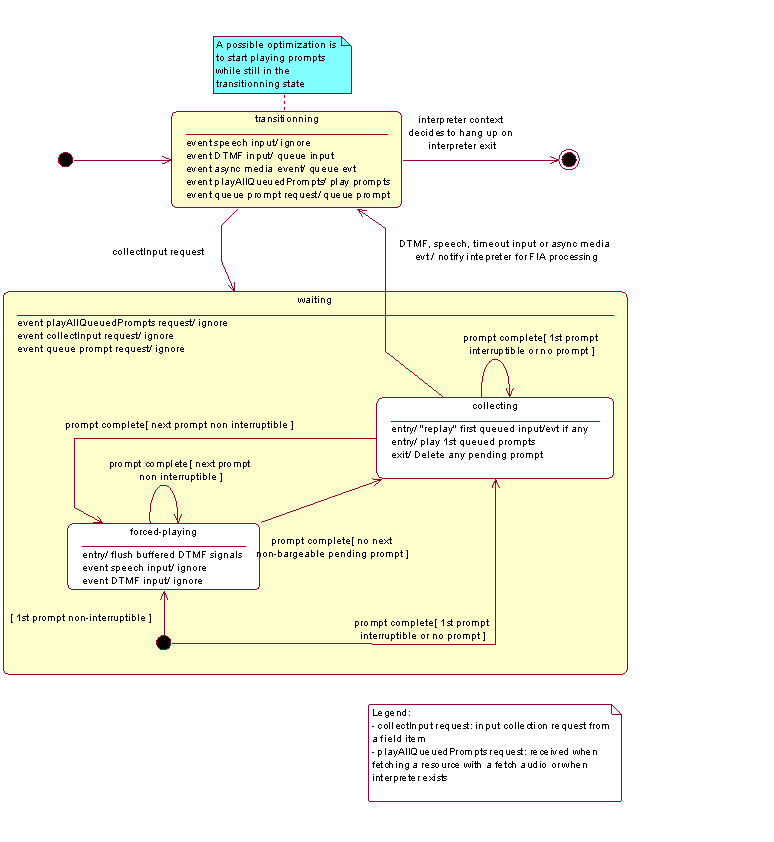- From: Guillaume Berche <guillaume.berche@eloquant.com>
- Date: Mon, 22 Apr 2002 17:11:21 +0200
- To: <www-voice@w3.org>
- Message-ID: <ELEGLIHGLLIBFPCIGAKGAENHCLAA.guillaume.berche@eloquant.com>
Hello,
I’m having troubles understanding the VXML 2.0 draft specs version from Oct
23, 2001, it seems to me that some parts are ambiguous or contradictory. Can
someone please point me to the appropriate section of the specs when I
missed them, or provide clarifications if needed?
In Section 4.1.8:
1) It seems incorrect to state that “While in the transitioning state
various prompts are queued, [...]by the <prompt> element in field items”
since the queuing of prompt elements in field items is part of the FIA
collect phase (Appendix C), which itself is part of the waiting phase (“the
waiting state is entered in the collect phase of a field item”).
2) When playing a non interruptible prompt, are matching DTMF or speech
input buffered or discarded? If buffered, how many matching DTMF or speech
input should be buffered? Would only the first input/DTMF be processed by
the processing phase of the FIA? Would subsequent input/DTMF be ignored or
buffered for the next input collection phase?
I believe a state diagram could help in precising the processing of input in
section 4.1.8. If this can be of any help, I’m attaching a draft UML state
diagram which describes my current understanding of the specs (Rational Rose
source file available on request).
3) For completeness, an extract from section 4.1.5 below should be
reproduced or at least mentionned in section 4.1.8:
“When the bargein attribute is false, any DTMF input buffered in a
transition state is deleted from the buffer”
In Section 4.1.5, it would clarify things to precise that the last sentence
from the extract below applies even if a subsequent prompt has a false
bargein attribute specified.
“Users can interrupt a prompt whose bargein attribute is true, but must wait
for completion of a prompt whose bargein attribute is false. In the case
where several prompts are queued, the bargein attribute of each prompt is
honored during the period of time in which that prompt is playing. If
bargein occurs during any prompt in a sequence, all subsequent prompts are
not played.”
To illustrate with an example, if an input interrupts the 2nd prompt, the
3rd prompt should not be played.
<form>
<field name=”contest”>
<prompt bargein="false">Welcome to our FOO contest</prompt>
<prompt bargein="true">Current time is 10 30 am</prompt>
<prompt bargein="false">This program is sponsored by ACME</prompt>
[...]
</field>
</form>
Concerning ECMAScript variables holding non-scalar values (such as field
item variable for a record fieldaudio, or the special _prompt variable as
mentionned in my previous mail)
- what ECMAScript type do they have? Is it indeed an ECMAScript an “host
object” as defined in the ECMAScript specifications (or Array object
containing other objects in the case of the _prompt variable). If so, what
is their exact list of properties along with their type and properties
(ReadOnly, DontEnum, DontDelete, Internal)?. As a side-question, what does
the ECMAScript typeof operator returns on these objects?
Concerning ECMAScript special variables (such as <name>$.<shadow_var> in
fields)
- can they be modified by (of as a side effect of) ECMAScript code
evaluation (such as evaluating a guard condition, or an expr attribute)?
Thanks for your help,
------------------------------------------
Guillaume Berche
Eloquant, ZA Le malvaisin
38240 Le Versoud, France
guillaume.berche@eloquant.com
------------------------------------------
Attachments
- image/jpeg attachment: InputFSM.jpg

Received on Tuesday, 23 April 2002 05:50:49 UTC